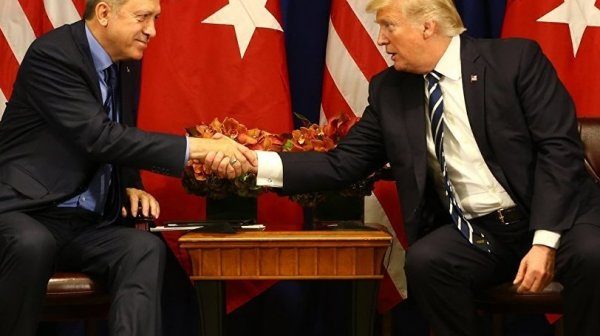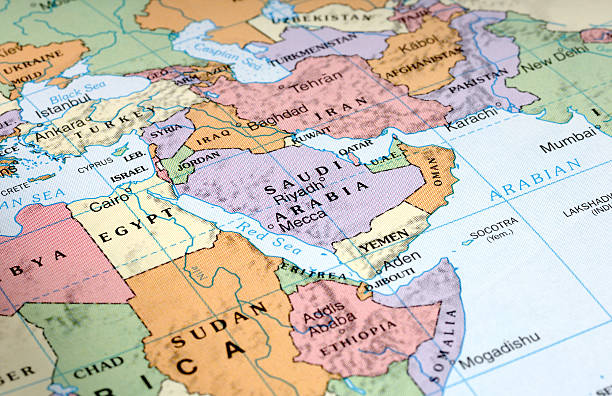
Co-authored with Yusuf Buluc (*)
A year ago, if one were patient enough to draw up a list of the problems on the Turkish-American agenda this would have reflected a relationship not between NATO allies or family members as some seem to remember in times of distress but adversaries. It is the overall bilateral chemistry, Syria, PYD/YPG, FETO, Iran sanctions, Turkey’s purchase of S-400s, US threat not to deliver F-35 aircraft, obstacles to trade, not to mention the Brunson case.
Any progress after a whole year? None at all, except Pastor Brunson leaving Turkey on October 12, 2018 under dubious judicial procedures.
A development which has much more than symbolic value is the delivery of the S-400 air and missile defense system to Turkey. Consequently, and as threatened by the US, Turkey is going to be excluded from the F-35 program costing the Turkish economy dearly. Ankara and Washington still seem unable to find common ground in their respective operations in Syria. The current situation almost begs the question whether they are seriously searching for that.
Turkey’s purchase of the S-400 missiles has led to speculation regarding the future of our relations with traditional allies. Our commitment to NATO has come under serious questioning as to Turkey’s reliability to fulfill the solemn undertakings of the Alliance.
Not only that, but other important questions remain unanswered as well: What is the threat analysis underlying the deal that renders the S-400 the ideal system to counter that threat? To what extent, if at all, Turkey’s precondition of transfer of missile technology has been met? The West is worried about the Russians gaining access to F-35 technology. Aren’t the Russians concerned about the West gaining access to S-400 technology through this deal? Or, do we enjoy their unreserved trust? Or, is it that Russian personnel to be co-located in the missiles’ deployment sites will ensure their physical security against possible intrusions to their technology? Did the Russians push for limitations regarding the areas for deployment or for restrictions regarding targeting? Are they able to maintain ultimate control over the employment of these missiles through cyber technology? And, if so, wouldn’t this strip Turkey of their command and control autonomy?
On the one hand, Washington is struggling to define and calibrate its response to the S-400 deal beyond Turkey’s exclusion from the F-35 program, reportedly telling Ankara that the missiles shouldn’t become operational if further sanctions are to be avoided. On the other hand, Sergei Chemezov, CEO of Rostec Corporation, the manufacturer of the Russian missiles has said that Moscow and Ankara are in talks regarding the joint production of parts of the S-400 air defense system. Moreover, he has announced Moscow’s readiness to sell the Su-35 fighter jets to Turkey if Ankara is interested. It seems that the bazaar is open for haggling, obviously not only for the marketing of military hardware but more importantly for the redefining of interests and political allegiances.
On the anniversary of the Gülenist coup attempt, President Erdoğan stressed how Turks had fought those trying to enslave their country. He mentioned Gallipoli, Kut al-Amara and War of Independence. He added that such schemes are still alive. It was clear that he had the West in mind, revealing his profound distrust.
Some days later, Foreign Minister Çavuşoğlu said, “We are currently running the process, whether it’s Incirlik, Kürecik or other issues. If America takes very negative steps toward us, if there are sanctions or further steps, we will have answers to America. If America has a hostile attitude towards us — as we have told them, we have no secrets — we take the counter-steps. It’s not a threat. It’s not a bluff.”
Washington seems to be undergoing an inter agency bargaining on sanctions itself. Since Ankara’s only ally in appears to be President Trump, such statements make one doubt whether Ankara’s real intention is to help him find common ground or pave the way for a rupture for which we will hold Washington responsible and conveniently reset our political compass to lead Turkey in another direction.
Some of Turkey’s past and present grievances against the West are understandable. Some are well-justified. However, even a cursory look at history shows that Turkish-Russian relations have been far more confrontational and marked by devastating wars.
In the early years of Turkey’s ruling Justice and Development Party (JDP) Ankara launched an open-ended accession process with the EU. Later, it became clear that Turkey under JDP rule would progressively digress from the democratic path. And the EU, lacking global and strategic foresight, failed to keep Turkey on board. President Obama’s initiative to make Turkey’s “vibrant, secular democracy” the centerpiece of his approach to the Middle East led nowhere. Thus, from having reasonably good relations with our traditional allies as well as with Russia and reinforcing regional bridges, we have now come to burning the ones linking us to Europe and across the Atlantic to the US.
The beginning of Turkey’s foreign and security policy downturn was the launching of West’s misguided regime change project in Syria in which Ankara most regrettably played a leading role. Given its 910-kilometer long and uninterrupted border with its southern neighbor, Turkey’s role assumed a strategic quality. This contrasted tragically with the fraternal relations between the two countries only a few months earlier. The first act of this unfolding drama led to an unprecedented loss of life, human suffering thanks also to the violence with which the Syrian political leadership chose to suppress the public uprising.
The second act started with Russia’s military intervention in October 2015 which enabled the international community to distinguish the actors from one another in view of their disparate roles and interests. In this act, Turkey’s earlier regime change project partners left the stage one by one with one exception: the US. But its sustained presence soon led to the emergence of the YPG as Washington’s major partner in the fight against the Islamic State and in tackling the issues stemming from it. Owing to several factors, US-YPG collaboration lying at its core, Turkey started partnering with Russia and Iran, increasingly dependent on the former. After the downing of Russian Su-24 by Turkey in November 2015 the stage setting briefly shifted from Syria to Brussels. There, Turkey’s foreign minister went out of his way in thanking NATO Allies for expressing their solidarity with Turkey. But there was no way Ankara could forgo its cooperation with Moscow. So, there came its begrudging apology to mend the relationship which by then had become indispensable for Turkey to project its air and land forces beyond its borders into Syrian airspace and territory.
In the third act, Moscow and Washington had completely changed roles, the former becoming Ankara’s leading partner and the latter an adversary. The third act ended with the beginning of the delivery of S-400 missiles to Turkey. Western audience was somewhat shocked; Russian officialdom gave Turkey a standing ovation, as this transaction opened up a golden opportunity for Russia to begin to harvest the proceeds of driving a wedge in the ranks of the Alliance. Turkish reaction was muted and puzzled. Inadvertently so, because it was deliberately kept in the dark as to which politico-military course the government was taking. Once a decision is labeled as “national” that is the end of the story.
How the fourth act will unfold is keeping everyone in suspense because all actors with the exception of Moscow are unpredictable.
Unfortunately, a country’s foreign and security policy is more than political theater. Major changes, let alone shift of axis, require profound and democratic debate. They cannot be brought to fruition through incremental steps taken almost as “fait accompli” by the singular choice of the leadership as in Turkey under an alla turca presidential system with no checks and balances and no parliamentary oversight. The people of the UK amply debated leaving the EU and held a referendum. A shift of axis by Turkey will be a hundred times more significant for the people of Turkey than Brexit would be for the people of the UK.
Is it our friends and adversaries who have changed or is it us? How much of this change is driven by domestic political considerations and to what extent has it been endorsed by the public? Have we forgotten our claim to be an element of regional stability? Is Turkey likely to shed its critical role as a country which gives confidence to its allies, not at the expense of drawing Russia’s ire, but into whose partnership Moscow would also choose to invest? Or, is Turkey going to turn its back on the West and become part of the Middle East or Central Asia? Are we done with our claim to inspire them? Or, have they started to inspire us? Because, if that is decidedly the choice of those leading us, then the people of Turkey have a right to know.
…………………………………………………………………………
(*) Yusuf Buluc is a retired Turkish Ambassador and a former Head of NATO’s Department of Defense Plans and Policy.
Ali Tuygan, Ambassador (Ret’d) and former Undersecretary of the Turkish Foreign Ministry. The article is also published on his blog.









